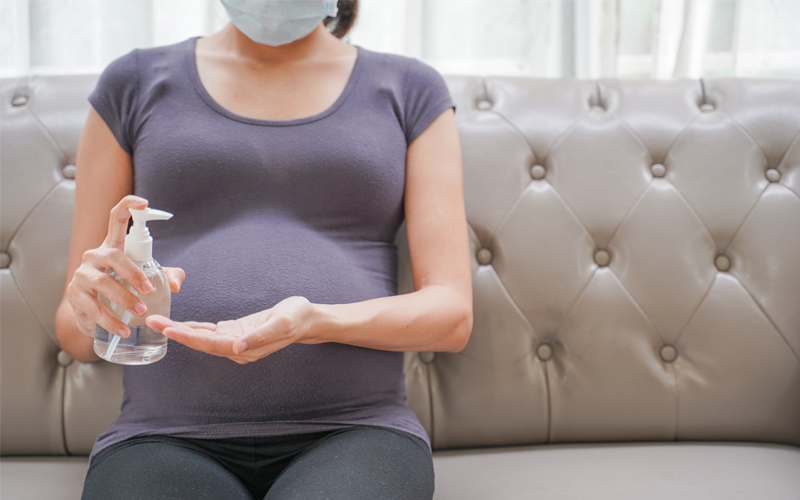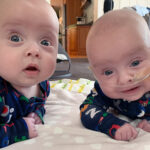Pregnant during the COVID-19 outbreak? What you need to know

If you’re pregnant and expecting to deliver your baby soon, you may have questions and concerns related to the current COVID-19 outbreak, especially if your child may need additional care after birth.
To answer some common questions about what to expect, we spoke with Dr. Louise Wilkins-Haug, director of Maternal Fetal Medicine in the Maternal Fetal Care Center (MFCC) at Boston Children’s Hospital and MFCC clinical social worker Laurie Oliver Taylor. They explained what new precautions are in effect in the MFCC and how day-to-day practices have changed since the outbreak.
Are you taking new precautions in the MFCC to help prevent the spread of COVID-19?
“Yes, we have made several changes in the hospital and the MFCC due to COVID-19,” says Taylor. These include:
- All patients and visitors are screened at the hospital entrance for symptoms of illness.
- Everyone, including staff, is given a mask to wear in the hospital to reduce the spread of person-to-person illness.
- You may notice reduced staffing in certain areas of the hospital. We are still here to provide all urgent and essential services to patients and families. However, we have cut back on some elective care based on state and federal guidance related to the COVID-19 outbreak.
- In addition to standard practices, all clinical spaces are cleaned per the latest hospital guidelines before and after each patient visit.
Have there been any changes to how care is delivered in the MFCC since the outbreak started?
“We have made a few changes in our practice to try to reduce patients’ time in the hospital, while maintaining the personal touch that is the hallmark of our program,” says Taylor.
- When possible, we will review outside images to reduce the need to repeat ultrasounds, MRIs, and echocardiograms at Boston Children’s. For patients who have their imaging done with us, they may leave the hospital after the imaging is completed, instead of waiting to speak with the consultant.
- Parents can now receive a video call at home from the clinical team to discuss test results and a proposed plan of care. The clinical team will send a summary of key findings and proposed treatment plans to the parents by email or a letter.
- Prenatal tours of the intensive care units (ICUs), where some babies may go for postnatal care, have been temporarily suspended. But our social work team can help families prepare by reviewing unit-specific practices and other available resources at Boston Children’s.
- Out of an abundance of caution during the outbreak, our Patient Family Housing Program has temporarily been suspended. There continues to be room for one parent to stay in the baby’s room in our Cardiac Intensive Care Unit (CICU) and Medical Surgical Intensive Care Unit (MSICU). Our social work team will work with parents to help find additional housing, if needed.
What do you tell pregnant moms who have concerns and fears about COVID-19 and giving birth during this outbreak?
“We try to explain that while this virus is new, we have supported mothers and families during other viral outbreaks and are prepared to provide needed guidance during pregnancy and delivery,” says Dr. Wilkins-Haug.
“We also tell parents that there is no specific evidence linking COVID-19 to low birth weight and other birth defects,” says Dr. Wilkins-Haug. She adds that because infants do not seem to be at higher risk of COVID-19 exposure during a vaginal delivery, there is no recommendation for a caesarian section delivery if the mother tests positive for the virus.
Are you still able to treat families from states beyond Massachusetts?
Dr. Wilkins-Haug says this information is changing quite rapidly. “At this time, people from outside of Massachusetts are asked to self-quarantine for 14 days upon arrival in the state. As increased testing is available, these recommendations will likely change.”
You can find current information about access to care at Boston Children’s on our COVID-19 webpage, the latest state guidelines about travel to Massachusetts on the Mass.gov website, and current national recommendations from the Centers for Disease Control and Prevention (CDC).
Are there special concerns for moms carrying babies with complex conditions?
“Prematurity is a concern for infants with a complex condition,” says Dr. Wilkins-Haug. “For these reasons, whether in the hospital or in the community, careful social distancing to lower the risk of COVID-19 infection is important for these mothers.”
She says that if a pregnant woman does contract COVID-19, it’s important to keep in touch with her primary provider. “While most pregnant women do well with recovery at home, the virus can alter course unexpectedly. In these cases, the mother’s care team can provide guidance as to when she may need to be hospitalized for respiratory concerns or preterm labor”
What happens if a new mom is diagnosed with COVID-19 during pregnancy or upon admission for delivery?
Dr. Wilkins-Haug says the care provided to new mothers will follow COVID-19 guidelines for isolation, respiratory precautions, and supportive care. “Delivery is performed in a negative pressure room with the health care providers in personal protective equipment,” she says. “If she needs a C-section, this is performed by the team in a negative pressure operating room to reduce the likelihood of the viral spread.”
To protect the baby from COVID-19 infection after birth, the mother and newborn are temporarily physically cared for apart from one another — either in separate units until discharge, or in the same room with a barrier between them.
“The virus has not been shown to be transmitted through breast milk, and the benefits of early breast feeding outweigh the risk,” says Dr. Wilkins-Haug. This means the mother can pump breast milk and have a healthy caregiver feed the newborn, or breast feed herself, while wearing a protective mask.
How is your team supporting expectant mothers and families during this stressful time?
“The stress and concerns of mothers and families who are expecting a child with a complex condition are heightened with the additional worries about COVID-19,” says Dr. Wilkins-Haug. “We do not take your questions and worries lightly, and are here to help you access resources and support. Your health care team will continue to reach out following your return home to assure that you, your family, and your infant have the resources and support you need.”
Get more answers about Boston Children’s response to COVID-19.
Related Posts :
-

My son is a NICU GraD: Here’s what I’ve learned
My husband and I aren’t first-time parents, but when our twins were born nine weeks early a year ago, ...
-

Model enables study of age-specific responses to COVID mRNA vaccines in a dish
mRNA vaccines clearly saved lives during the COVID-19 pandemic, but several studies suggest that older people had a somewhat reduced ...
-

New insight into the effects of PPIs in children
Proton-pump inhibitors (PPIs) are frequently prescribed to suppress stomach acid in patients with gastroesophageal reflux disease (GERD). Prescribing rates of ...
-

Un hito en la Costa Este: El bebé Isaac está evolucionando después de una reparación fetoscópica por minilaparotomía de espina bífida abierta
Isaac Suardi aún no lo sabe, pero ya ha hecho historia. Recién nacido en julio, es el primer ...





